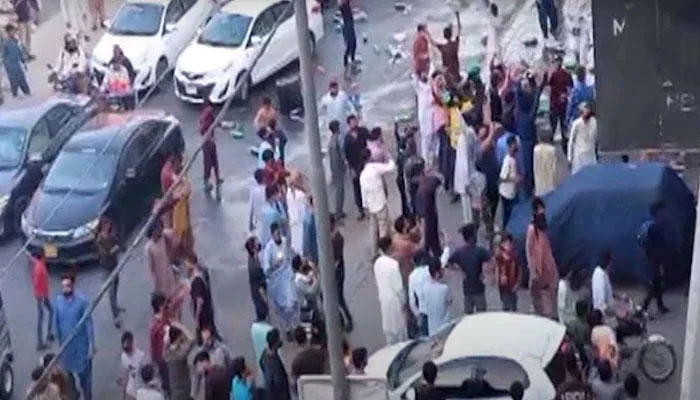At the mob’s mercy
Until actual inciters of violence and disinformation are brought to book, mob violence and attacks on religious minorities will continue
Pakistan’s long-running ordeal with mob lynching and violence shows no signs of coming to an end. The latest addition to this series of senseless deaths took place in Karachi on Friday and resulted in the death of a businessman reportedly belonging to the Ahmadi community. The victim was allegedly beaten to death after a mob stormed a place of worship belonging to the Ahmadi community in the city’s Saddar area. Around 40 other members of the community were also taken into ‘protective custody’ by the police to keep them safe from the mob and were later returned to their homes. The mob that attacked the community centre is reported to have included around 400 people, many of whom allegedly belonged to a religious political party, although said party has denied its involvement in the incident. The aftermath of the incident saw the customary condemnations and calls for investigation and punishment from human rights organisations, political leaders and state officials. Sadly, none of this is likely to stop the mob violence or make religious minorities in Pakistan any safer. It never has in the past.
Ironically, the same day this killing was taking place in Karachi, a court in Faisalabad was handing down a death sentence to an accused in the 2023 Jaranwala riots case. While it is encouraging to see the authorities cracking down on religious violence and punishing perpetrators, the incident in Karachi, and several others like it, suggest that this is likely not a long-term solution to the problem of religiously motivated mob and/or vigilante violence. In fact, the problem only seems to be getting worse. In a report released last month titled Under Siege: Freedom of Religion or Belief in 2023-24, the Human Rights Commission of Pakistan (HRCP) noted that religiously motivated violence and discrimination are increasing yearly. Within the period covered by the report, July 2023 to June 2024, it has found at least five religiously motivated killings during this period and notes that, while perpetrators of violence are often held accountable, people who preach and incite violence often get away with doing so.
Until the actual inciters of the violence and disinformation are brought to book, mob violence and attacks on religious minorities will continue. This task is, sadly, only complicated by the rise of social media, which not only enables disinformation to spread further and faster but also allows those inciting violence to hide behind a veil of anonymity. Of course, in many cases, those doing the inciting are rather well known and use their popularity and influence as a shield against the state. This is a hurdle that the authorities must overcome. There is also a need to tackle the deeply embedded instinct to handle any offences or wrongdoings, proven or otherwise, with one’s own hands. This is a trend often encouraged by the state’s inability to deliver justice, but often only leads to more innocents being harmed or killed. Take, for instance, the recent protests against fast food chains accused of having ties to genocide. One such protest led to a fast food worker being shot dead in Sheikhupura. This is how vigilante violence and misinformation can turn even a legitimate grievance, like addressing and countering those who support the Zionist state’s genocide, into further tragedy. One way to address this would be by raising awareness through mass media – much like a recent TV play tried to do through its brilliantly executed story on mob lynchings. Justice rarely, if ever, comes at the hands of a mob. But, until the state fully asserts its sole authority to handle the whole process of accusations and punishments, more mobs are what we will get.
-
 Claude Still Down? Latest Updates On Outage
Claude Still Down? Latest Updates On Outage -
 Watch: Nancy Guthrie's Suspect Break His Silence After Being Dubbed Masked Kidnapper
Watch: Nancy Guthrie's Suspect Break His Silence After Being Dubbed Masked Kidnapper -
 'Deadliest Catch' Star Dies In Tragic Incident At 25
'Deadliest Catch' Star Dies In Tragic Incident At 25 -
 Kawhi Leonard Earns All-NBA Praise From Zach Lowe After Clippers Turnaround
Kawhi Leonard Earns All-NBA Praise From Zach Lowe After Clippers Turnaround -
 Nuggets Vs Jazz: Jamal Murray’s 45 Points Power Denver Past Utah
Nuggets Vs Jazz: Jamal Murray’s 45 Points Power Denver Past Utah -
 Justin Timberlake Moves To Block Release Of Body Cam Footage From DWI Arrest
Justin Timberlake Moves To Block Release Of Body Cam Footage From DWI Arrest -
 Kim Jong Un’s Future Under Speculation: Could His Daughter Lead North Korea?
Kim Jong Un’s Future Under Speculation: Could His Daughter Lead North Korea? -
 Nancy Mace Under Investigation By House Ethics Panel For Alleged Overcharges
Nancy Mace Under Investigation By House Ethics Panel For Alleged Overcharges -
 'Sinners' Star Jayme Lawson Calls Out BAFTA Organisers For Exploiting Tourette's Advocate
'Sinners' Star Jayme Lawson Calls Out BAFTA Organisers For Exploiting Tourette's Advocate -
 Lauren Boebert Gets Yelled At By Hillary Clinton Over Leaked Photo During Epstein Deposition
Lauren Boebert Gets Yelled At By Hillary Clinton Over Leaked Photo During Epstein Deposition -
 Is It A Full Moon Tonight? NASA Says Blood Moon Will Light Up Canada
Is It A Full Moon Tonight? NASA Says Blood Moon Will Light Up Canada -
 Priyanka Chopra Reveals Why Her Late Dad Would Have 'loved' Nick Jonas
Priyanka Chopra Reveals Why Her Late Dad Would Have 'loved' Nick Jonas -
 US Embassy In Riyadh Hit By Drones As Fire Breaks Out In Diplomatic Quarter
US Embassy In Riyadh Hit By Drones As Fire Breaks Out In Diplomatic Quarter -
 Sean ‘Diddy’ Combs Set For Early Prison Release Amid Appeal
Sean ‘Diddy’ Combs Set For Early Prison Release Amid Appeal -
 Zendaya's Mom Breaks Silence Over Tom Holland Wedding Confession
Zendaya's Mom Breaks Silence Over Tom Holland Wedding Confession -
 Dax Shepard Set To Make Shocking Revelation About Childhood Sexual Abuse In New Memoir
Dax Shepard Set To Make Shocking Revelation About Childhood Sexual Abuse In New Memoir




